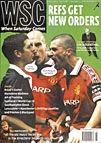 John Harding pays tribute to Cliff Lloyd, the man who formed what is known today as the Professional Footballers Association
John Harding pays tribute to Cliff Lloyd, the man who formed what is known today as the Professional Footballers Association
Cliff Lloyd, OBE, who died earlier this month, was the last link with the old Players’ Union, the organisation reformed by Billy Meredith back in 1907 and now known as the Professional Footballers Association. Indeed, Lloyd was one of the last to speak to Meredith when, in 1957, he visited the ailing Welshman in his Manchester home. Lloyd recalled that Meredith had a string of medals in a box beneath his bed which, he pointed out, had done little for him in financial terms.
Lloyd liked to tell the Meredith anecdote to make a similar point, that no matter how much a professional player achieved on the field of play, his security and ability to earn a decent wage would always be uncertain. Lloyd worked tirelessly to redress the imbalance of power between the clubs and the men they employed, but there is little doubt that, towards the end of his life, he felt that the pendulum had swung too far in the players’ direction.
In fact, in 1961, when, along with union chairman Jimmy Hill, he led the successful campaign to remove the maximum wage ceiling, Lloyd was unhappy that star players suddenly became free to earn sky-high wages while the vast majority remained on a pittance.
If the 1961 negotiations had proceeded along the lines that he and other members of the PFA management committee had wanted, the unnaturally low maximum would have been replaced by a more flexible system of performance-related bonuses, thus spreading the available money around.
Instead, the League and the clubs, anxious to keep a contract system that allowed players no opportunity to negotiate or to leave their designated clubs, tossed the union the dubious carrot of unlimited wages for the elite. Not unnaturally, it caught all the headlines and diverted everyone’s attention from the real issue, that of players’ freedom.
In 1963, Lloyd dealt the hated retain-and-transfer system a hefty blow when, almost single-handedly, he defied the League in the High Court to secure George Eastham’s release from his contract with Newcastle United. But when he finally stepped down from the PFA secretary’s post in 1981, players had not moved very much closer towards controlling their own contractual affairs.
Lloyd had succeeded Jimmy Fay as union secretary in 1953 after a war-interrupted playing career with Liverpool, Wrexham and Fulham. Jimmy Fay had been with the union in one capacity or another since its formation in 1907, struggling to keep the organisation afloat. For the majority of Lloyd’s tenure money remained scarce and the modest offices in the now demolished Hanging Ditch in Manchester accurately reflected the union’s lowly status.
But Lloyd built solid foundations: an insurance policy to provide for players who had to leave the game prematurely; a fledgling education programme to prepare players for life after football; and representation on governing bodies to influence the development of the game. And thus, when the TV money suddenly arrived, the union was in good shape to develop and expand its influence at all levels of the game. Everybody – players, administrators, officials and fans – has benefited in some way from that influence.
The original Players’ Union, despite ridicule from on high, near-bankruptcy and rank-and-file in-difference, always placed the well-being of the professional game at its heart. Lloyd kept that faith for 28 long years. His successors still operate in his shadow.
From WSC 157 March 2000. What was happening this month